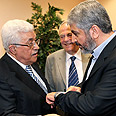
Report: Syria, Turkey involved in Palestinian unity deal
UK paper says brokering Fatah, Hamas reconciliation included secret meetings with Turkish FM; enlisting Syria's support, foiling Egypt's attempts to derail deal
The Palestinian unity agreement which has disturbed both the Israeli and the American governments recently was brought upon by a complex effort that included secret meetings between Palestinian intermediaries, Egyptian intelligence officials, the Turkish foreign minister, Palestinian President Mahmoud Abbas and Hamas Politburo Chief Khaled Mashaal – the British Independent reported Tuesday, aiming to reveal the "untold story of the deal that shocked the Middle East."
The Fatah-Hamas deal, which was signed in Cairo in April, is another step towards the Palestinian demand for a state.
- Receive Ynetnews updates directly to your desktop
Veteran Mideast reporter Robert Fisk cites a series of detailed letters exchanged between Fatah and Hamas that expose the complexity of the reconciliation process.
According to the report, Hamas had sought and received the support of Syrian President Bashar al-Assad, the country’s Vice President Farouk al-Sharaa and Foreign Minister Walid Moallem. The effort yielded an agreement by Mashaal to end Hamas rocket attacks on Israel from Gaza – since resistance would be the right only of the state – and agreement that a future Palestinian state be based on Israel’s 1967 borders.
“Without the goodwill of all sides, the help of the Egyptians and the acceptance of the Syrians – and the desire of the Palestinians to unite after the start of the Arab Spring, we could not have done this,” Palestinian businessman and billionaire Munib al-Masri told the Independent. Masri was part of the group of political activists, academicians and businessmen from both Gaza and the West Bank who facilitated the deal, particularly through the new Egyptian government that formed after the ousting of President Hosni Mubarak.
“I thought the divisions that had opened up could be a catastrophe and we went for four years back and forth between the various parties,” Masri said. “Abu Mazen (Mahmoud Abbas) asked me several times to mediate. We opened meetings in the West Bank. We had people from Gaza. Everyone participated. We had a lot of capability.”
Mubarak regime 'worked for Israel'
Masri recalled one meeting that the Palestinian team held with Egyptian Foreign Minister Nabil al-Arabi in Cairo. “Arabi said: ‘Can I bring in the foreign minister of Turkey, who happens to be in Egypt?’ So we all talked about the initiative together." And so Ahmet Davutoglu was brought into the negotiations.
"That’s how I found out that ‘new’ Egypt had a lot of confidence – they were talking in front of Turkey; they wanted to talk in front of Turkey. So we agreed we would all talk together,” Masri said.
Masri recounted travelling between Cairo, Gaza, the West Bank, Amman and Damascus – a trip that required a detour around Daraa, a city overrun by protests against Assad's regime.
Also according to the article, a similar reconciliation effort early last year was thwarted by Mubarak's government, which tried to place obstacles between Fatah and Hamas. "Mashaal had fruitlessly met with Omar Sulieman – Mubarak’s intelligence factotum and Israel’s best friend in the Arab world – in Mecca," Fisk wrote. "Sulieman effectively worked for the Israelis. Now all had changed utterly."
Masri also spoke about the one of the biggest problems that Israel and the US have with the agreement – Hamas' refusal to recognize the Jewish state. "…as long as they are not in the Palestinian government, Hamas are just a political party and can say anything they want," Masri said. "So America should be prepared to see Hamas agreeing on the formation of the government. That government will abide by UN resolutions – and international law. It’s got to be mutual."
- Follow Ynetnews on Facebook










